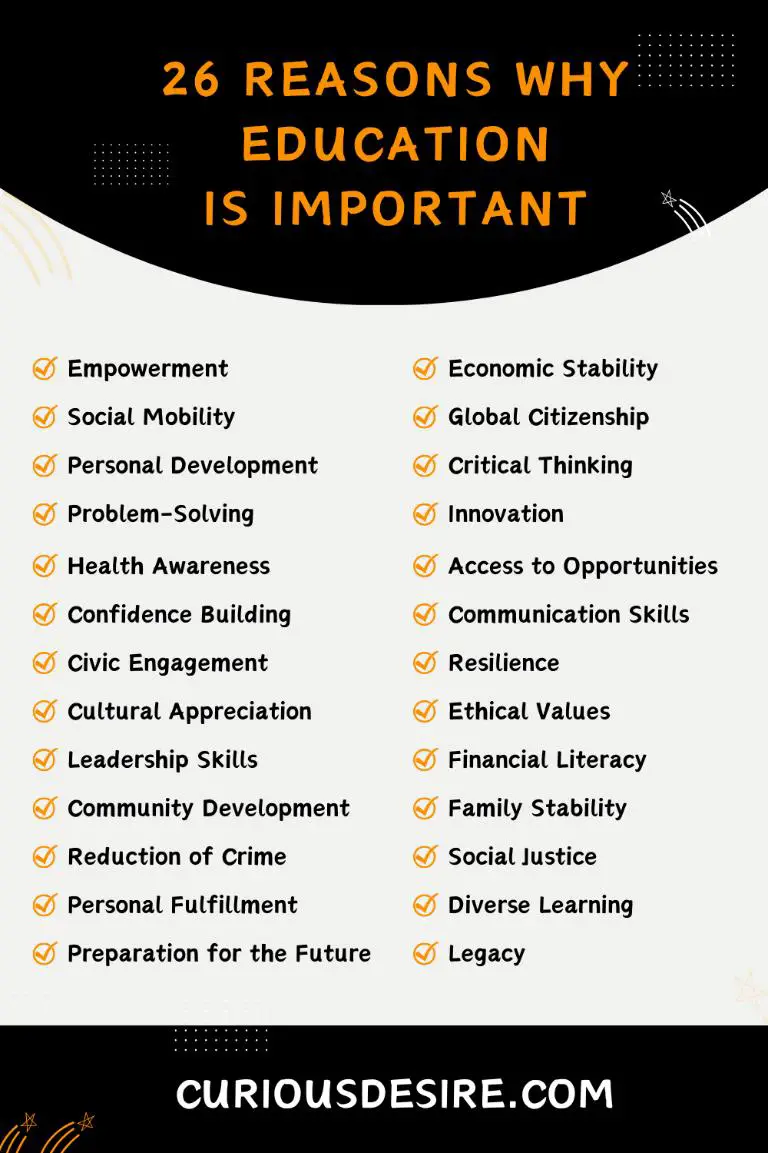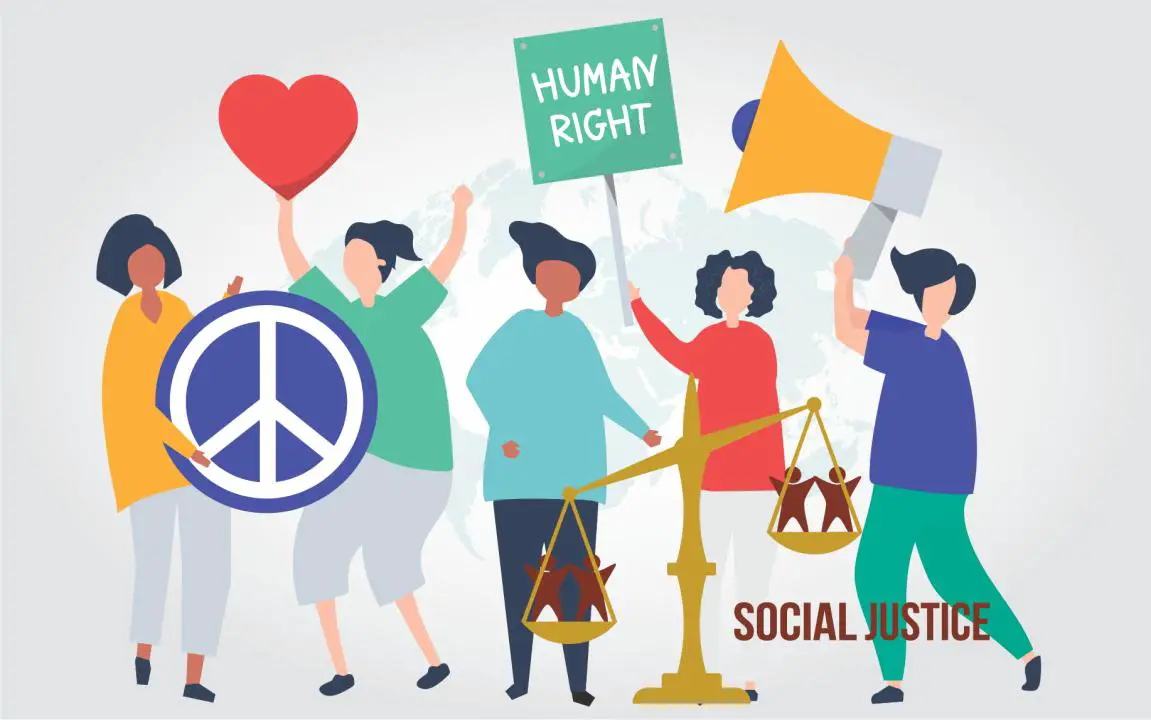Education stands as a fundamental pillar of human development and progress.
From childhood to adulthood, education shapes minds and societies, empowering individuals to reach their full potential and contribute meaningfully to the world.
In this article, we’ll discuss the importance of education, touching upon its profound impacts on personal growth, economic prosperity, social cohesion, and beyond.
Here are the top 5 reasons behind the importance of education:
- Enhances Critical Thinking
- Promotes Health Awareness
- Promotes Resilience
- Contributes to Crime Reduction
- Instills Ethical Values
[toc]

1. Provides Empowerment
One of the main reasons that education is important is that it equips people with the tools and knowledge to take control of their own lives.
It provides them with the confidence and skills needed to make decisions that positively impact their personal, professional, and social spheres.
With education, individuals are empowered to pursue their goals and aspirations with clarity and purpose.
They become more aware of their rights, responsibilities, and opportunities, enabling them to address life’s challenges more effectively.
2. Ensures Economic Stability
Acquiring skills and knowledge through education enhances an individual’s earning potential and reduces the risk of unemployment.
By gaining qualifications and expertise, people are better equipped to secure stable and well-paying jobs.
Education also opens doors to various career paths and opportunities for advancement, providing financial stability and security.
Moreover, a well-educated workforce contributes to economic growth and prosperity by driving productivity, innovation, and entrepreneurship.
3. Facilitates Social Mobility
Education serves as a powerful tool for upward social mobility, enabling individuals to transcend socioeconomic barriers and achieve success regardless of their background.
By providing access to quality education, society can level the playing field and create equal opportunities for all.
Education empowers individuals to break free from the constraints of poverty and discrimination, opening doors to better jobs, higher incomes, and improved quality of life.
4. Promotes Global Citizenship
Education promotes a sense of global citizenship by promoting cross-cultural understanding, empathy, and respect for diversity.
Through exposure to diverse perspectives, cultures, and worldviews, individuals develop a broader outlook on global issues and challenges.
They become more aware of their interconnectedness with people from different backgrounds and regions, fostering a sense of solidarity and cooperation.
5. Encourages Personal Development
Education is a transformative journey that nurtures personal growth, self-awareness, and fulfillment.
It provides individuals with opportunities for self-discovery, exploration, and self-expression, enabling them to realize their full potential.
Through education, people develop a deeper understanding of themselves, their values, and their aspirations, leading to greater self-confidence and resilience.
Education encourages lifelong learning and personal development, empowering individuals to adapt to change, overcome obstacles, and pursue their passions with purpose and enthusiasm.
It promotes a sense of curiosity, creativity, and intellectual curiosity, enriching lives and enhancing overall well-being.
6. Enhances Critical Thinking
Critical thinking is a foundational skill cultivated through education, enabling individuals to analyze, evaluate, and interpret information effectively.
It involves questioning assumptions, challenging beliefs, and examining evidence to arrive at informed conclusions.
Education encourages individuals to think critically about complex issues, consider multiple perspectives, and make reasoned judgments based on evidence and logic.
Critical thinking skills are essential for problem-solving, decision-making, and navigating the complexities of the modern world.
7. Fosters Problem-Solving
Problem-solving skills are essential for overcoming life’s challenges and achieving success in various endeavors.
Education equips individuals with the tools and strategies needed to identify problems, generate solutions, and implement effective action plans.
It encourages creativity, resourcefulness, and resilience in the face of adversity.
Through education, individuals learn to approach problems systematically, break them down into manageable components, and apply critical thinking skills to develop innovative solutions.
Problem-solving skills are applicable across all aspects of life, from personal relationships and professional endeavors to civic engagement and global challenges.
Education empowers individuals to become proactive problem-solvers, capable of addressing complex issues and making meaningful contributions to society.
8. Drives Innovation
Innovation is the driving force behind progress and prosperity in society. Education plays a fundamental role in promoting a culture of innovation by enhnacing creativity, curiosity, and entrepreneurship.
It provides individuals with the knowledge, skills, and mindset needed to think outside the box, challenge the status quo, and develop groundbreaking ideas and solutions.
Education encourages experimentation, risk-taking, and collaboration, creating an environment conducive to innovation and discovery.
By investing in education, societies can cultivate the next generation of innovators, scientists, inventors, and leaders who will shape the future and drive positive change in the world.
9. Promotes Health Awareness
Education plays a crucial role in promoting health awareness, disease prevention, and overall well-being.
By providing individuals with access to health education and information, societies can empower them to make informed decisions about their health and lifestyle choices.
Education provides an understanding of the importance of healthy behaviors, such as proper nutrition, regular exercise, and preventive healthcare measures.
It equips individuals with the knowledge and skills needed to identify health risks, seek medical assistance when necessary, and advocate for their own health needs.
Furthermore, education empowers individuals to become agents of change in promoting health and wellness within their families, communities, and societies at large.
10. Facilitates Access to Opportunities
Education opens doors to a wide range of opportunities, including employment, higher education, scholarships, and networking.
By investing in education, societies can empower individuals to reach their full potential and pursue their aspirations.
Education provides the foundation for lifelong learning and personal growth, enabling individuals to adapt to changing circumstances and seize new opportunities as they arise.
11. Builds Confidence
Education plays a crucial role in building self-confidence and self-esteem, empowering individuals to believe in themselves and their abilities.
By acquiring knowledge, skills, and experiences through education, people gain the confidence to face challenges, take risks, and pursue their goals with determination.
Education provides opportunities for personal growth, exploration, and self-discovery, enabling individuals to develop a strong sense of self-awareness and self-worth.
12. Develops Communication Skills
Effective communication is essential for success in all aspects of life, from personal relationships and professional endeavors to civic engagement and social interactions.
Education plays a crucial role in developing communication skills, both verbal and written, enabling individuals to express themselves clearly, confidently, and persuasively.
Through education, people learn how to articulate their thoughts and ideas, listen actively to others, and engage in meaningful dialogue and discourse.
Moreover, education promotes empathy, understanding, and respect for diverse perspectives, enhancing communication and collaboration in multicultural settings.
13. Encourages Civic Engagement
Civic engagement is essential for a healthy and vibrant democracy, enabling individuals to participate actively in community and civic affairs
Education plays a crucial role in promoting civic engagement by promoting a sense of civic responsibility, citizenship, and social awareness.
It helps individuals learn about their rights, responsibilities, and the importance of civic participation in shaping public policies and decisions.
Moreover, education provides opportunities for civic learning and engagement, such as community service, volunteerism, and political activism.
14. Promotes Resilience
Resilience is the ability to bounce back from adversity, overcome challenges, and thrive in the face of adversity.
Education plays a crucial role in promoting resilience by equipping individuals with the skills, mindset, and support systems needed to cope with life’s ups and downs.
Through education, people learn how to adapt to change, manage stress, and develop healthy coping strategies.
15. Helps Cultural Appreciation
Education promotes cultural understanding, appreciation, and respect for diversity.
Through education, people learn to appreciate the richness and complexity of human cultures and societies, celebrating their similarities and embracing their differences.
Moreover, education encourages dialogue, exchange, and collaboration across cultural boundaries.
16. Instills Ethical Values
By instilling ethical principles and values such as honesty, fairness, and respect for others, education helps shape individuals’ character and conduct.
Through education, people learn to make ethical decisions, uphold moral standards, and act with integrity in their personal and professional lives.
By investing in ethical education, societies can cultivate a culture of trust, accountability, and ethical leadership, promoting the common good and ensuring the well-being of all members of society.
17. Develops Leadership Skills
Education plays a crucial role in developing leadership skills and qualities in individuals.
By providing opportunities for learning, growth, and mentorship, education empowers individuals to become effective leaders and agents of change in their communities and society at large.
Leadership education can cultivate a new generation of visionary leaders who are committed to serving the common good and making a positive impact on the world.
18. Promotes Financial Literacy
Education also has a very crucial role in promoting financial literacy, responsibility, and independence.
It provides individuals with the knowledge, skills, and resources that are needed to manage their finances effectively, education empowers them to make informed decisions about saving, investing, and budgeting.
Through education, people learn about basic financial concepts such as budgeting, saving, investing, and managing debt, as well as how to protect themselves from financial fraud and exploitation.
19. Supports Community Development
For community development, empowerment, and resilience education is a must.
By providing individuals with access to quality education, societies can unlock their full potential and build stronger, more vibrant communities.
Education promotes social cohesion, inclusion, and a sense of belonging, as well as providing opportunities for personal growth, economic advancement, and civic engagement.
Moreover, education promotes community resilience by equipping individuals with the knowledge, skills, and resources needed to address local challenges and adapt to changing circumstances.
20. Strengthens Family Stability
Access to good education helps families stay strong and happy. When people have the chance to learn important things, they can make better lives for themselves and their families.
Learning also helps parents support their children in school and keep them healthy. Plus, education can help families earn more money, so they’re not as likely to be poor.
By making sure everyone has the chance to learn, communities can break the cycle of families struggling, and make life better for everyone.
21. Contributes to Crime Reduction
Education is important for making communities safer. When people have the opportunity to learn, they can think more clearly and make better choices.
This can help stop things like crime and violence. Learning also gives people a sense of belonging and purpose, which makes them less likely to do bad things.
So, when societies focus on giving everyone access to good education, they can create safer neighborhoods where everyone can live happily.
22. Promotes Social Justice
Other than a reduction in crimes education promotes fairness, equality, and human rights.
When everyone has the chance to learn and grow, societies can work to fix problems like discrimination and inequality.
Education empowers people to stand up against unfair treatment and fight for positive change.
23. Enhances Personal Fulfillment
Learning brings happiness and meaning to people’s lives. When people have the chance to learn new things and follow their passions, they feel happier and more fulfilled.
Education helps people discover their interests and talents and connects them with others in their community.
By investing in education, societies can create happier and more fulfilling lives for everyone, making the world a better place for all.
24. Encourages Interdisciplinary Learning
Encouraging people to learn about different subjects helps them see how everything is connected.
When people have the chance to explore diverse topics and ideas, they become better at thinking critically and solving problems.
Education breaks down barriers between subjects and encourages collaboration.
25. Prepares for the Future
Access to good education helps people get ready for what’s ahead. When people learn important skills and develop a positive attitude, they can face challenges with confidence.
Education teaches resilience, innovation, and adaptability, so people can handle whatever comes their way.
26. Leaves a Lasting Legacy
Education passes on knowledge and wisdom from one generation to the next.
When people have the chance to learn from the past and shape the future, they create a legacy of learning and growth.
Education helps people understand where they come from and where they’re going.
By investing in education, communities can leave a lasting legacy of enlightenment and progress for future generations to build upon.



